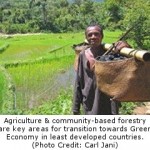
United Nations – Nuclear power is growing in popularity globally as concerns grow over climate change, and should be accessible to rich and poor countries alike, the International Atomic Energy Agency (IAEA) said on Monday.
IAEA Director General Yukiya Amano told a meeting to discuss the nuclear Non-Proliferation Treaty that more than 60 countries were considering using nuclear power to generate electricity.
He said between 10 and 25 new countries were expected to bring their first nuclear power plants online by 2030.
“Nuclear power is enjoying growing acceptance as a stable and clean source of energy that can help to mitigate the impact of climate change,” Amano told the meeting at U.N. headquarters in New York. “Nuclear power must be accessible not only for developed countries but also for developing countries.”
“Nuclear power needs to be efficient, sustainable and profitable. Any expansion in its use must be done safely and securely, and without increasing the proliferation risk,” said Amano, who became the head of the U.N. nuclear watchdog in December.

Nuclear reactor accidents at Three Mile Island in the U.S. state of Pennsylvania in 1979 and Chernobyl in Ukraine in 1986 sparked safety fears and left many countries wary of developing nuclear power.
But as the world battles global warming – which scientists say is caused by greenhouse gases emitted by fossil fuels – nuclear power is being reconsidered as a less expensive and more environmentally friendly alternative.
“Nuclear safety has improved considerably since the Chernobyl disaster in 1986. However, we can never be complacent and need to remain vigilant,” Amano said.
There are 189 signatories to the 1970 nuclear Non-Proliferation Treaty, which is intended to stop the spread of nuclear weapons and calls on those with atomic warheads to abandon them.
The month-long meeting, which began on Monday, is held every five years to assess compliance and problems with the treaty.
The NPT treaty guarantees countries the right to peaceful nuclear programs, though developing countries say that wealthy states have been trying to deprive them of nuclear technology under the guise of proliferation concerns.
Source: Reuters, May 3, 2010














